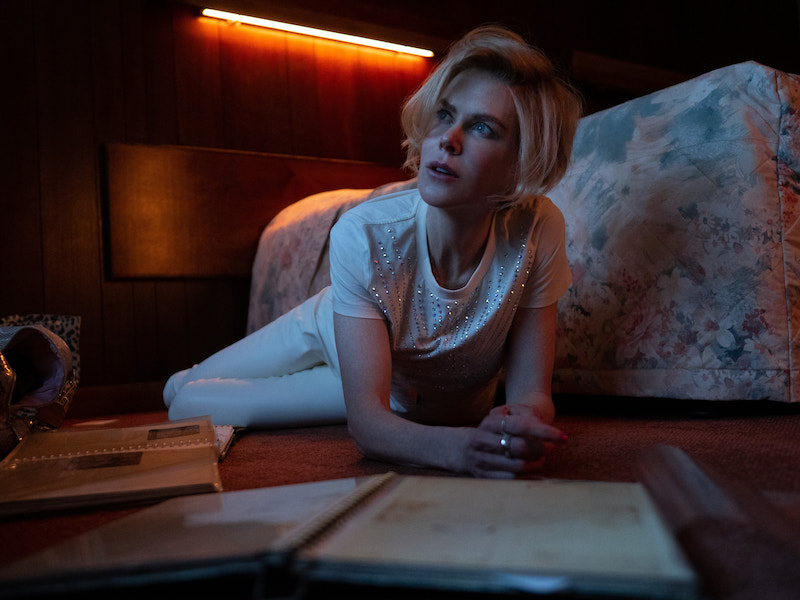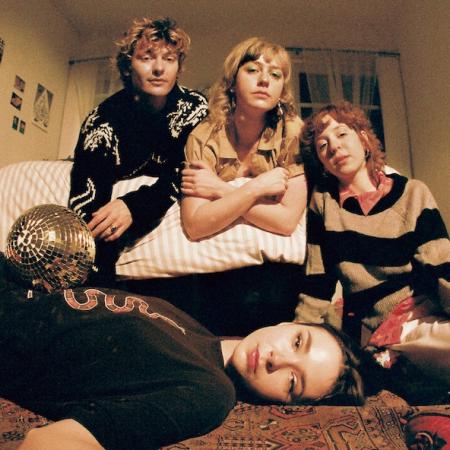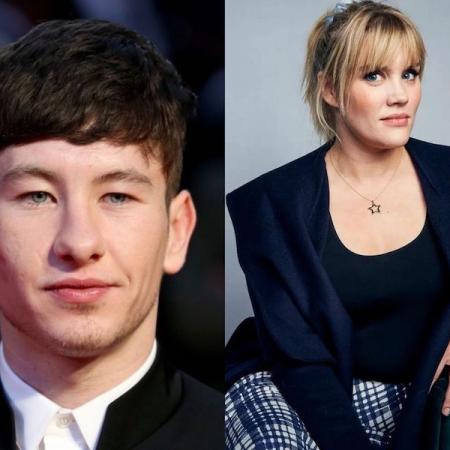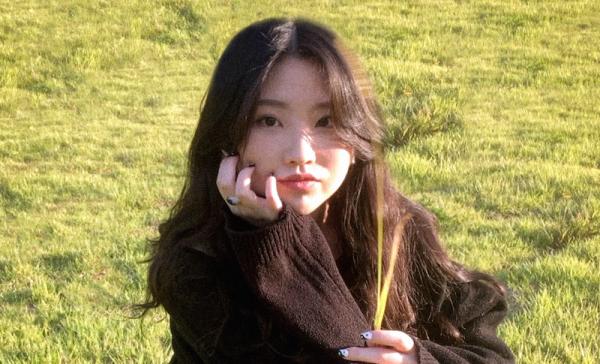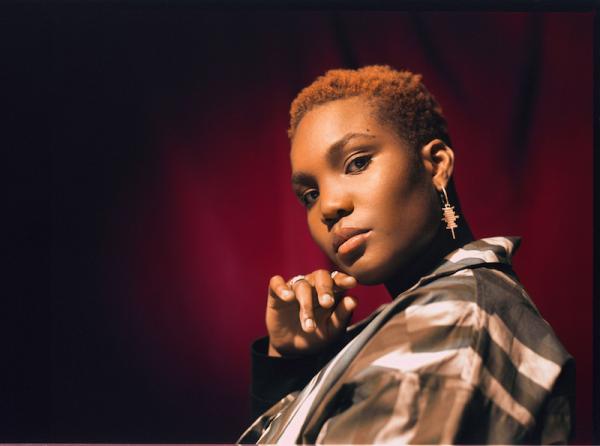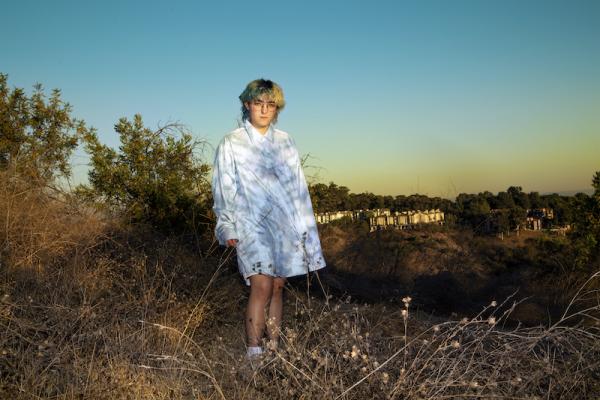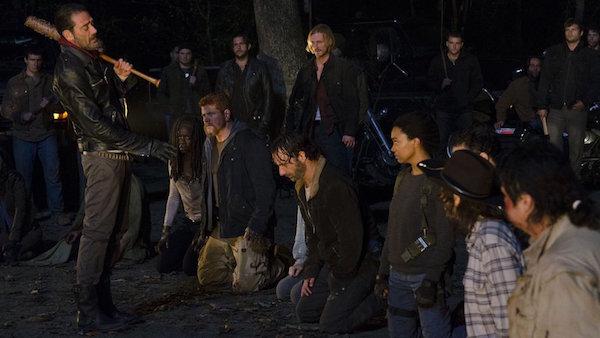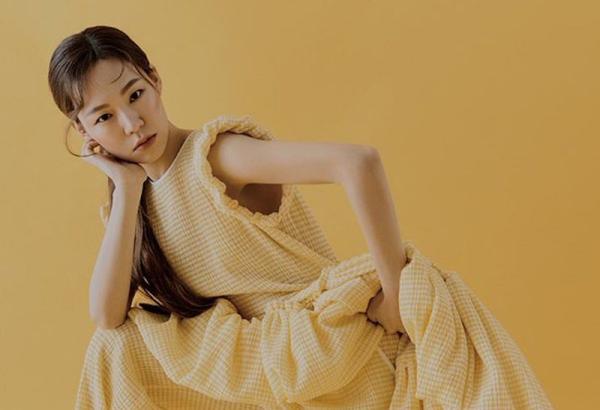The new anthology series 'Roar' has just dropped on Apple TV+, spanning genres, characters, and settings. Uniquely, each of the eight stand-alone episodes features a woman having to endure a universal hurdle that women face, in an extraordinary way. The show features everything from the likes of women eating photographs to preserve the past, being kept on a shelf like a trophy, and finding bite marks on their bodies as their maternal guilt manifests physically.
Aligned with the release of the show, Nicole Kidman (who stars in Episode 2 as well as executive produces), show-runners Liz Flahive and Carly Mensch, and executive producer Bruna Papandrea tell you everything you need to know about 'Roar'...
Our first question, was really going back to Cecilia [Alhern]'s book, what were your initial thoughts when you first read the book?
CARLY MENSCH: I think [Bruna] was the first read?
BRUNA PAPANDREA: I’m pretty sure Nicole and I read it and we generally read everything at the same time because we send each other something and it’s a race to see who can read it fastest. I actually remember a very significant moment. I was with my very young children at the time, it was very chaotic and I remember reading the book, and speaking to Cecilia, and the story that really struck me originally was 'The Woman Who Found Bite Marks On Her Skin'. Because I was a new mother, I had a career, and I was so frazzled and frenzied, and I just kept asking myself, ‘Women can’t do it all, is this a myth?’ I remember speaking to Cecilia about her inspiration with her third or fourth child and literally walking to the side of a hill writing freehand this story. For me, I just felt that there were so many specific stories that would resonate with people everywhere and they would gravitate toward different ones. In my case, that’s the one at the time that felt very relevant to me. As with everything, I called Nicole first and then we just chat about it.
NICOLE KIDMAN: First and foremost, for me, I went and I read it and I went, “How do you do something really bold and fun but put great people together?” Because so much of the experience is the people, you know? The stories were strong, but it was more like, "Who were we gonna have chemistry with? And who was going to bring their own stamp to this?" Liz [Flahive] and Carly, they are such shining examples of bold, creative women who are really carving their own paths. That’s what this whole book to me was about; telling these stories, but supporting these stories. We want to give parts to women and the things they’re thinking about that may be odd, that may be completely private, that may be shameful, that may be all of these things. But we can bring them to the surface and go, “We’re either all experiencing, have experienced or know someone who’s experiencing it.” But not preaching, giving it in that magical realism way where it’s inviting as well to watch - hopefully captivating.
LIZ FLAHIVE: I think for us, Carly and I were being sent many, many things after ‘Glow’ and we also rarely respond to the same thing. I remember many times, I’ll read something and like it, and Carly will hate it and that’s not a thing that works for us and vice versa. When we read this, we were both like, “Huh.” and then the next day we were like, “Hmm.” It just kept gnawing at us and we started talking about it and had a similar feeling that there was a lot of space for us to do our own thing. After we spoke to Cecilia, it was very clear that she was open to really letting us adapt with a capital A and make a lot of the stories our own which we really took to heart. I think that was a big part of our response to the book was that it felt like there was room for us and there were many things in there that we could respond to and expand on freely.
CARLY: It’s funny, the stories stuck with us but also the images really stuck with us. I remember holding onto those images for weeks. I remember reading the stories and then I would have flashes of a woman eating a photograph, a woman sitting on a shelf; I couldn’t shake those. I think that was a bit new for Liz and I, we definitely connected narratively but I think something that was new and exciting for us was imagistic stickiness and how mischievous the stories were on some level.
NICOLE: Yes! Mischievous! <laughs>
LIZ: As we started to break them, they felt like a dare. They all have that sort of spirit, even in making them, you know?
NICOLE: Truth or dare or both. <laughs>
LIZ: Exactly, both. Ideally both.
NICOLE: Ideally both. <laughs>
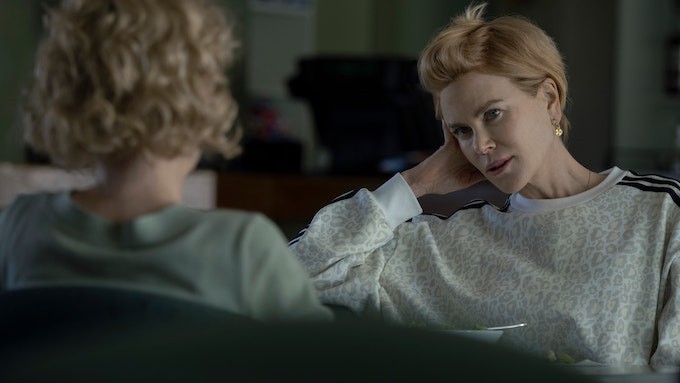
Following up on that, Nicole, can you just talk to us a bit through how the project came together?
NICOLE: It was one of those things where it was extremely easy. It was like we all jumped in. It was very fluid, there was a flow to it. It was just getting on the phone and talking and the hardest part was going, “Which stories?” Liz and Carly had very strong ideas about which ones to tell, because there’s such an array there, and you go, “Which one? Which one? Which one?” There’s only a certain amount of time and money so you have to go, “Quick, which are the ones we are all relating to?” and I think for me, the photograph one was something that could be set in Australia, which was important to me. I wanted it to have a deep sense of who I am in it. Strangely enough, it was also during Covid so it seemed like it would be a lot easier to shoot there. It was very much an easy serendipitous union. There was never effort with this, which I think is beautiful, it was like, “Well, you think that, well, let’s think of that, let’s do this, let’s do that.” Liz and Carly are so strong and extraordinary in their daring attitudes. They’re just like, “No, this is how we want to structure it. This is what we think. This is what we feel.” And then they allow ideas in. They’re also leaders which is a beautiful thing when you’re an actor. They have a strong sense of partnership but also being the show-runners and the creators. Their leadership is warm, but very, very strong; and I love that.
LIZ: From the beginning I think we were all on the same page. Everyone was game that as we collected other performers and other directors; everyone was really game. You have to kind of get on the ride with what we’re trying to do. There are many weird ideas in this project and we love them. We had people who were really willing to jump in and invest fully for their episode which was thrilling.
NICOLE: Yeah, because there’s meant to be a sense of experimental nature to it which is really bold of Apple, and we’re so grateful to them for doing that. Talk about walking the talk and giving us this chance and supporting new filmmakers, supporting us as women, supporting storytelling like this with just an enormous amount of trust and that has to be called out; because it’s rare, you know? It’s really rare. It’s what we’re all committed to. But it was also not going, “Oh, let’s just pop this with huge amounts of really, really famous people and just find these idiosyncratic filmmakers to come in and help us, or give people like Kim Gehrig a chance,” when she’s not had a chance to do drama with actors that she wants to work with. Give her a chance at her stage in life, which is in her 40s, where she has worked and she’s raising kids and didn’t have the time to make a feature. She could do commercials and she could do music videos, but she hadn’t actually had the time or the wherewithal because of her commitments as a woman and family to go and make a feature film. This was her chance to go and put her toe in the water with drama. It’s so good being able to do that. It’s so good to be able to say to other women, “Oh, we’re gonna take a bet on you and we’re gonna give you a chance that no one else is giving you right now.”
The result is truly extraordinary. Which episode would you say is the most different to how you initially envisioned it when you first read the book, and which is the most similar, and why?
LIZ: I think the one that’s the most different from when we read it in the book was definitely 'The Woman Who Was Fed By A Duck' and that was different from its inception. That was a story that Carly and I were not considering at all, until we brought Halley Feiffer aboard. The way we work with the writers was we sent them the book and asked them which stories they responded to, and then they picked a few and we kicked those around. In the book it’s about a woman who’s having a bad day and a duck comes out of the pond and talks to her and gives her some advice.
CARLY: The duck feeds her advice. It was meant in a positive way. We read the book and we circled the ones that we responded to, but I think in the spirit of what Bruna and Nicole were infusing in us, we wanted to let the writers feel empowered to kind of follow their own creativity and inspiration. Halley’s response to that story, we were both so surprised with. That was the first one she responded to, she said, “You know, I was really annoyed at that duck. He was really mansplaining, he was such a dick and so toxic! I wonder if there’s a relationship there to be explored between this kind of toxic man-duck and this woman on the bench?” Liz and I were first of all just completely surprised and then excited that somebody saw something we hadn’t in the story, and we’re like, “Keep going Halley, we’re supporting you.” Every step along the way the four of us here would have different reactions, but then we would all be like “But if we’re not pushing ourselves, why are we making this series?” and I remember Nicole going to bat for this episode more than anyone.
NICOLE: I think the most important thing was us just going, “Listen, it’s very easy to do what’s expected, and it’s very easy to fit into a box. And it’s very easy when you have some sort of success to go, ‘Okay, we’re just gonna coast along on what we can.’” It’s much harder to keep having that sort of indie spirit, where you just go, “I gotta have the indie spirit alive and forever in me, and if I can do that, then I’m gonna keep exploring, growing, and changing.” This series was about, for me, just going, “Don’t just do what’s expected in the box here and do the formulaic things, always be trying to find different ways to express, support and push forward.” That’s sort of the essence of it for me. Anything that was kind of weird or outlandish or strange, we’re all in a place of being able to support exploration; why not? Sometimes that’s gonna be incredibly successful and sometimes it’s gonna be like, "What?” and some people are gonna respond brilliantly to it. My whole career has been based on that. I’ll never stop doing it and I love it. I love when it creates conversation or people get angry, or people get upset, or people get thrilled, or people become joyful because the safe way is actually terrifying to me. Safety terrifies me.
BRUNA: I was gonna say, that’s when I knew you were the right person to be producing it. I remember very clearly this story and I remember Liz and Carly like, “Okay, so here’s what it is…” and they were just talking about it, and I was like, “Oh fuck, that’s never gonna work,” and I remember you going, “Yeah, yeah, yeah, that’s bold!” and I remember just thinking, that is kind of why your career Nicole is defined by making…
NICOLE: The weirdest!
BRUNA: But also I don’t think people know that about you, you’re just, “Yeah, why not? Let’s go for it.” It is a level of experimentation and we are in visual fucking storytelling; you can take risks. That was the whole point of the project and of course in Liz and Carly’s hands guiding that, you know that that’s gonna be good even if some people don’t get it. I remember that moment thinking, “God, I’m safer than you.” <laughs>
NICOLE: Eating photographs is like the weirdest sensation I have to say. Sitting in a toilet cubicle, eating photographs, and then it seems so obvious at the same time. It’s the most weird thing and the first time I did it, I’m like, 'Oh, yeah, actually this is like a box of chocolates.' It’s interesting how if you just change your perception of what’s weird and what’s not and maybe I’m just crazy weird, but it doesn’t seem so weird to me. I think that we’re always gonna be, as women, trying things. I would speak on all four of us when I say you’re never gonna break our spirits. That was our commitment to each other. When Covid came and we lost our locations - and you can’t get on planes and you gotta quarantine - we were so up against it in so many different ways, as were all the productions that were shooting through this period. But there’s either give up and abandon it and put everybody out of work or there is, “Let’s soldier on through and make lemonade out of lemons.”
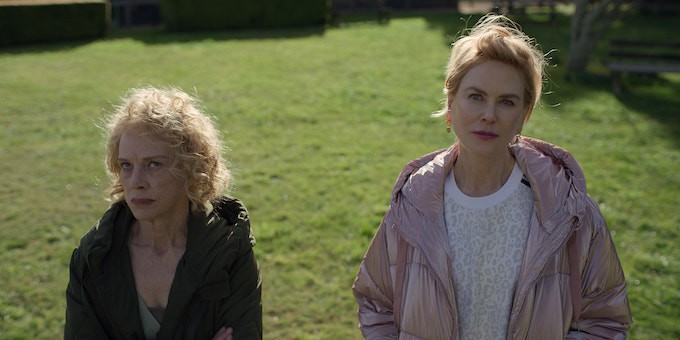
Well, Nicole, people are curious to know if you actually did eat those photographs.
NICOLE: I did. I did and I got a rash around my mouth. <laughs>
LIZ: They were made of marzipan and rice paper. We had two versions.
NICOLE: Then there was one that was sort of just more… they kept saying, “Ah no, it’s rice paper,” but it really tasted like paper. That was actually the most delicious. The marzipan was a little too much.
LIZ: It’s thick.
NICOLE: It was sickening but I ate so many, I ate about 50 of them and then I was like, “Ooh, maybe I’ve gone too far.” I didn’t realise. I was so caught up in the moment, as is my way, that I didn’t realise how many I’d eaten. I had this huge rash all around my mouth and I was like, “Ooh, I feel really...” but I’ve eaten 20 bananas once in in a film called ‘Birth’.
Could you share with us which story you personally identified with the most and why?
LIZ: I think ‘[The Woman Who Found] Bite Marks [On Her Skin]’, I won’t speak for Carly, but I think I’m speaking for both of us. That was kind of our way in. It was the first one we wrote. When we started writing it, I had two little kids and when we did our final revision, Carly had two little kids. It was really one of those stories that developed when Cynthia [Erivo] came aboard and Rashida [Jones] came aboard but the core of it, being able to really externalise a story about maternal guilt was something that I think felt really personal to both of us. It was one of those episodes where I remember, and this is not usually how we are on set, but I remember there was a line when we were in rehearsal, and Carly was just like, “I don’t know if my husband can watch this. This just feels so autobiographical this scene.”
CARLY: I think I had just weened my second child the day before we started filming it. So I was just going in as a mess and then having to teach Cynthia how to use a breast pump and I was like, “I’m far too close,” but yeah, that one felt the most autobiographical. A story we don’t mention a lot, but ‘The Woman Who Returned Her Husband’ it’s written about an older couple, that’s inspired by Vera Santamaria’s parents. I also find that one deeply relatable just as someone in a marriage. It’s a really beautiful ‘What if?’ about where the fault lines and breaking points in marriages [are], and why do people come back together? I find that one really deeply relatable though as Liz said, I think our way in and our kind of most-the closet to us is definitely ‘[The Woman Who Found] Bite Marks [On Her Skin]’.
Nicole, I hope you do really get to make another eight.
NICOLE: I would love that we would get the chance to tell eight more of them, because they’re so just delicious, and hopefully there’s a deliciousness to watching them. The great thing is, you like one, you can watch another one; you don’t like one, you can go to the other one. There’s flavours there for everyone, which is fun. I find that really fun.
What excites you the most about the episodes coming out?
NICOLE: I’m in one of the eight. So, I really wanted to put my support behind other people. There’s a point in your career where you can go, “Gosh, I have a chance to get things made. I don’t have to be the starring person in it, I can be a supporting in this to offer up other people to shine.” That was probably the biggest thing and that’s what I’m excited for. When you see some of the performances, and some of the writing, and some of the direction in this, it’s gorgeous and really interesting and fab.
All eight episodes of Roar are available on Apple TV+.


